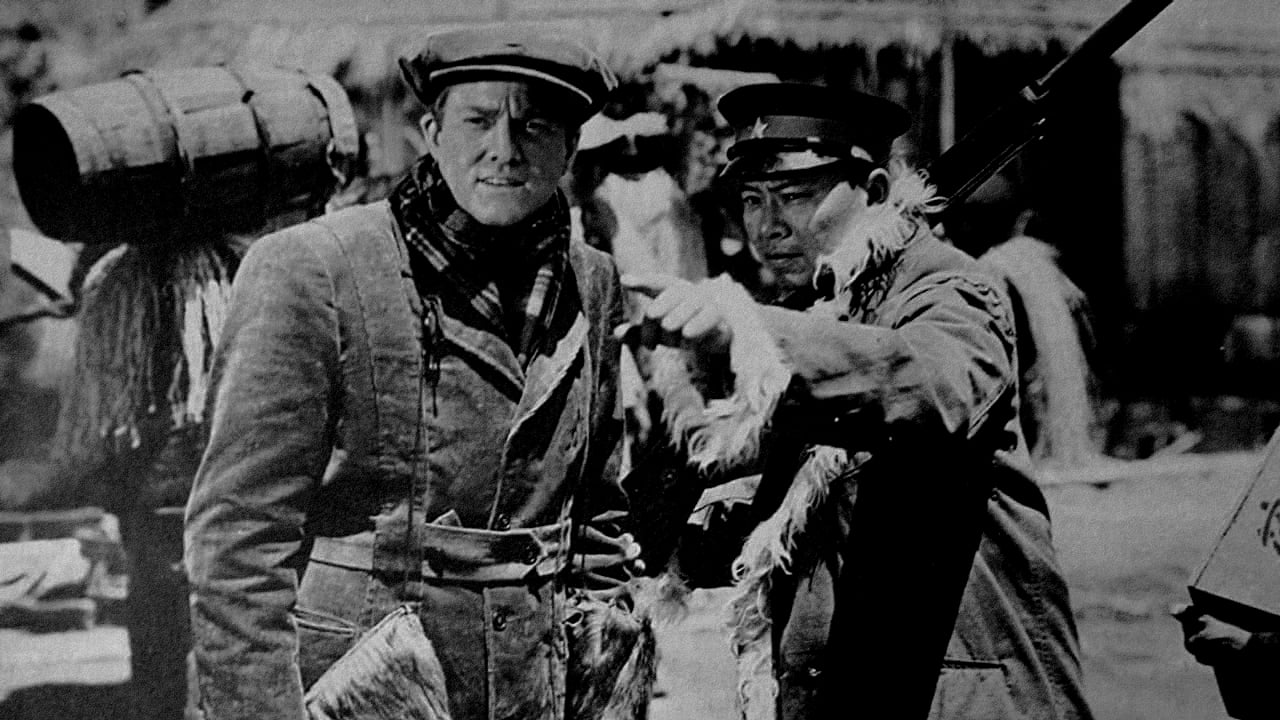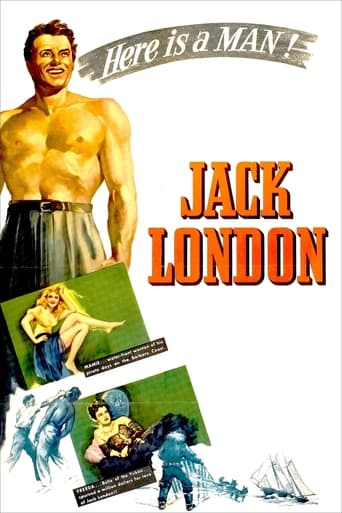Redwarmin
This movie is the proof that the world is becoming a sick and dumb place
Aedonerre
I gave this film a 9 out of 10, because it was exactly what I expected it to be.
Keira Brennan
The movie is made so realistic it has a lot of that WoW feeling at the right moments and never tooo over the top. the suspense is done so well and the emotion is felt. Very well put together with the music and all.
Asad Almond
A clunky actioner with a handful of cool moments.
HotToastyRag
When making a historical biopic, it's important to keep the dramatics up. "Then this happened, then this happened, etc." gets pretty tedious after a while. Jack London is one of the more boring biopics to avoid.Michael O'Shea plays the title character, and while he seems to have had an eventful life, Ernest Pascal's screenplay managed to make his life look like a series of disjointed episodes. First he works in a factory, then he's falling in love with Virginia Mayo, then he's a sailor, then he's at war, then he's getting a college education, then he's writing, then he's falling in love with Susan Hayward. . . There's no linear connection to anything, and Jack London isn't really given enough character development to make the audience root for him and therefore overlook the bad screenplay. Unless your favorite book is Call of the Wild, I wouldn't recommend watching this movie. For an interesting historical biopic, try The Adventures of Mark Twain or The President's Lady instead.
Robert J. Maxwell
This fanciful biography bears only a family resemblance to Jack London's life. (Maybe it should have been called "Jack Liverpool".) The writer and director have taken a remarkable man whose life went from the pits through triumph to tragedy and turned it into a moral tale that belongs in a comic book of the period.I was a fan of Jack London as a high school kid -- loved his short stories about adventure and adverse circumstances. Later I was able to view his work from a more mature and generous perspective. He wasn't a great writer but he put out some gripping stuff based on his own experiences. "The Sea Wolf," which is barely alluded to in the movie, is a fine work, at least until we get into that plummy romance. Anyone familiar with the San Francisco Bay area should read the opening, in which "Hump" takes a ferry from the city to Sausalito and is rammed in the fog by another ship. It's flawless description. The circumstances are so aptly rendered that it could happen the same way tomorrow.Okay. So here's Jack London up in the Yukon during the gold rush. That's the source of stories like "The Call of the Wild" and "To Build a Fire." And what do we get? Five minutes of Michael O'Shea in a small log cabin, alone except for a dog, looking out the window at the snow and having a conversation about his work with the dog, Buck, who gives a fine performance, by the way.The editing is terrible. It's not a flaw or a virtue that brings attention to itself very often. But I couldn't tell whether O'Shea was married to Susan Hayward, just visiting, or shacking up with her. London becomes an "oyster pirate." What is an oyster pirate? Another episode begins with talk of war breaking out and London receives an offer to go to Japan as a correspondent. WHAT war? Who is going to war with whom? Is it World War I? If so, why is London going to Tokyo? The words "Russo-Japanese War" (1905) are never mentioned.That war itself takes up about the last third of the movie and it's curiously rendered. The movie was released in 1943. The Japanese are all smiles, bows, torture, and treachery. They open the conflict by attacking the Russians at Port Arthur without warning "to get, how do you say in your country, the first punch?" London replies: "You mean a sucker punch." (Kids, that's a reference to the Japanese attack on the US bases at Pearl Harbor in 1941, that led to World War II. PS: We won.) The Japanese massacre pitiful Russian prisoners who are dying of thirst, and they explain to London exactly how they plan to go about conquering the world, including the US and Britain, when the time comes.In 1963, a big-budget movie called "55 Days at Peking" was released. It was about the Boxer Rebellion in China, which took place 5 years before the Russo-Japanese War. In "55 Days at Peking", the Japanese are our allies, the Russians are shifty, and the Chinese are enemies. Politics makes strange bedfellows.As London, Michael O'Shea is likable without being a particularly impressive actor. He has a fresh, open face that looks like the map of Ireland. His family were all Irish cops in Hartford. Virginia Mayo is his first girl friend. He goes through one or two more, just in case the audience has any doubt about his gender orientation, until he meets Charmiane, the love of his life, upon whose book this movie is based.I don't think I'll go on. In life, Jack London did begin his go-to-hell life as an oyster pirate -- robbing the bivalves at night from oyster beds belonging to someone else. He was a union man and socialist, an imprisoned vagrant, a sailor. He did go to the Yukon and did become a famous writer. He was one of the first to establish an artist's colony in Carmel, California, on Monterey Bay. Then he got into heroin and booze and retreated to a ranch in what is now wine country, where he died in 1916.
kalendjay
This is a dog and I don't mean "White Fang". What could have been a low budget, puckish travel adventure is hijacked and turned into a strange yellow peril piece. After enduring an hour of unadventurous travelling and business details about journalist London (we don't get much of him as a novelist other than an opening montage of a shelfful of books) we are introduced to a little costume piece about his travails in Japan, and internment under what seems to be a pseudo concentration camp for Russian soldiers. We are informed that what makes London such a patriot is the apparent revelation by a Japanese host that Japan has a master plan of conquest because they do not have an empire and cannot survive on trade.Truth told, especially during the depicted Russo-Japanese War, is that all the great powers had the same attitude. And London probably owes his survival to Teddy Roosevelt's negotiation of the peace (only TR's anger over London is shown).London was also a white supremacist and anti semite,whose obsession with adventure sounds like misanthropy. If analogized to his similar contemporary Rudyard Kipling, we might have seen the characterization of a dashing poet, ironist, and visionary of human nature, and not a Bowery Boy. Some poetry does seem evident in the script at the very end.O'Shea struggles mightily as the lead, but he is no Spencer Tracy and has none of the Irish charm or humorous physicality. And how about Hayward as his beau? 'Oh yes! I already know you are going to leave me for nine months to cover the war because I love you that much!' After scripts like that, you'd be known as the foulest mouth in Hollywood too, and get the inclination to tear the eyes out of every studio exec you meet.
MartinHafer
Aside from the fact that the actor, Michael O'Shea, looked a lot like Jack London, there is nothing positive I can say about this monstrosity of a film. It purports to be a film about the life of London, but frankly it bears about as much similarity to his life as it does Foghorn Leghorn's or Lassie's! Plus, the real reason for this film is a thinly disguised anti-Japanese rant.As far as London's life goes, aside from a few sketchy details, most of his life is unrecognizable in the film. In real life, he was married twice, ran about with prostitutes and died quite young--none of which are even alluded to in the film! Instead, it mostly fictionalizes his life up until he became a war correspondent during the Russo-Japanese War (shortly after the turn of the century). And, while London was really a correspondent at that time, the film is basically an anti-Japanese picture--taking the worst of London's experiences and adding a lot of 'we will one day rule the world' thrown in to boot. Now I DO understand why this was done--after all, the Japanese and US were fighting a war against each other in 1943. And, it was true that there were militaristic forces that felt exactly like the characters in the film--but the film was about 1903-1904--not 1943. And so, to make the Japanese look terrible, the film took many liberties. This is funny, as during the actual Russo-Japanese War, American sentiments were mostly pro-Japanese! The bottom line is that the film makers should have either made a real biography of London or they should have made an anti-Japanese propaganda film. Propaganda films have a positive place if done correctly and reasonably accurately (this IS possible and the US made many such films during the war). Because the film tries to be both, it does a terrible job of both--and completely sanitizes and obscures London's real life exploits (which WOULD make for a fascinating film) and comes off as preachy and fake. Bad propaganda and even worse history--even O'Shea's good acting and the presence of a young Susan Hayward could do nothing to overcome a crap script.By the way, if you'd like to see a Japanese movie about a real life person that is filled with anti-American propaganda due to it being made during WWII, try watching Akira Kurosawa's film from his Judo series--"Sanshiro Sugata Part Two". While the film was set during the 1800s, an evil American was randomly thrown into the film to get beaten up by the hero of the story and to bolster anti-American sentiments in the audience! It manages to be even more superficial than "Jack London" in this regard.


